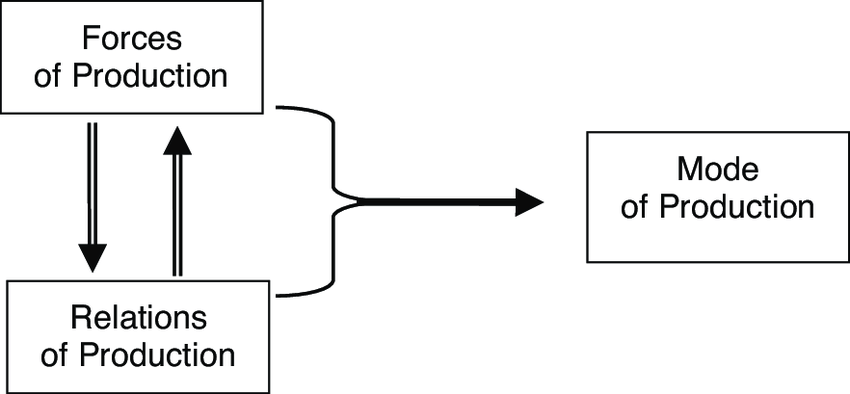I. Introduction to Mode of Production
Karl Marx’s concept of “mode of production” is foundational to his theory of historical materialism. It provides a framework for understanding how human societies organize economic life and how these systems shape and are shaped by social relations.
Definition: Mode of Production is the combination of:
- Forces of Production – the means and methods of producing goods (e.g., tools, machines, land, labor power).
- Relations of Production – the social and economic relationships individuals enter into, in the course of production (e.g., owner-worker, lord-serf).
Together, these form the economic base, which influences the superstructure (institutions like the state, religion, education, etc.).

II. Components of Mode of Production
1. Forces of Production
- Physical means: land, natural resources, tools, machines.
- Human labor: skills, knowledge, energy.
- Technical knowledge and innovation.
2. Relations of Production
- Ownership of the means of production.
- Division of labor.
- Power relations in the production process.
Example: In a capitalist factory:
- Owner owns machines (means of production).
- Workers do not own the factory but sell their labor for wages.
III. Historical Evolution of Modes of Production (Historical Materialism)
Marx argued that society’s history is a progression through different stages, each defined by its mode of production:
| Stage | Main Classes | Key Features |
|---|---|---|
| Primitive Communism | No class division | Collective ownership, subsistence economy. |
| Ancient/Slave Society | Masters and Slaves | People are owned as property. |
| Feudalism | Lords and Serfs | Land-based economy, fixed hierarchy. |
| Capitalism | Bourgeoisie and Proletariat | Private property, wage labor, capital accumulation. |
| Socialism (future) | Workers | Collective ownership, central planning, reduced class conflict. |
| Communism (ideal) | Classless society | Stateless, classless, moneyless society. |
IV. Dialectical Change and Contradictions
Marx believed each mode of production contains internal contradictions which lead to its transformation:
- E.g., under capitalism: exploitation of workers → class struggle → revolution → socialism.
Quote:
“The history of all hitherto existing society is the history of class struggles.” – Karl Marx
V. Relevance in Contemporary Societies
- Capitalism and Globalization:
- Gig economy: Workers have less security (e.g., Zomato, Uber).
- Automation: Shifting nature of labor.
- Digital platforms: Data and tech as new forces of production.
- Informal Sector in India:
- Large part of workforce not in formal wage labor.
- Reflects pre-capitalist relations within capitalist economy.
- Agrarian India:
- Landlord-tenant relations reflect feudal remnants.
- Neo-feudalism and Crony Capitalism:
- Political-corporate nexus distorting capitalist competition.
VI. Criticisms of Marx’s Mode of Production
| Thinker | Critique |
| Max Weber | Overemphasis on economy; ignores role of ideas, culture, religion (e.g., Protestant Ethic). |
| Antonio Gramsci | Focused on hegemony; argued that ruling class maintains power via consent, not just force. |
| Louis Althusser | Rejected base-superstructure simplicity; emphasized ideological and repressive state apparatuses. |
| Claude Lévi-Strauss | Argued culture and kinship systems also shape social life, not just economic forces. |
| Feminist Scholars | Marxism ignores unpaid domestic labor and gender as a relation of production. |
| Postmodernists | History is not linear; Marx’s theory is Eurocentric and ignores diversity of experiences. |
VII. Contemporary Extensions and Applications
- Immanuel Wallerstein – World Systems Theory
- Mode of production applied to global system: Core, semi-periphery, periphery.
- David Harvey – Marxist Urbanism
- Spatial and temporal analysis of capitalism.
- Erik Olin Wright – Class Map
- Complex model of class: contradictory class locations (e.g., supervisors, freelancers).
- G.A. Cohen – Analytical Marxism
- Sought to make Marx’s ideas more logically rigorous.
VIII. Conclusion
Karl Marx’s concept of mode of production provides a powerful tool to understand historical change, class relations, and socio-economic structures. Despite criticisms and evolving contexts, it remains a foundational concept in sociology and political economy.
Core Insight:
Human history is shaped not just by ideas, but by how people produce their material life and who controls that production.